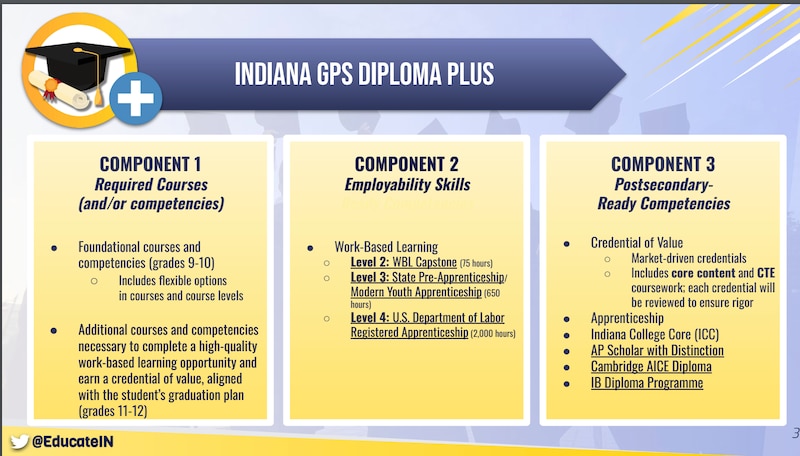Sign up for Chalkbeat Indiana’s free daily newsletter to keep up with Indianapolis Public Schools, Marion County’s township districts, and statewide education news.
Indiana is doubling down on a big bet: Work experience can better prepare students for success after high school than a prescribed set of courses.
The state is redesigning its high school graduation requirements to de-emphasize college-going as the pinnacle of educational attainment, and instead prioritize rewarding students for workplace readiness.
Beginning with the Class of 2029, students would earn either the standard Graduates Prepared to Succeed (GPS) diploma or the workplace-focused GPS Diploma Plus, per the state’s plan, which would end the Core 40 diplomas, including the Academic Honors diploma.
At its Wednesday board meeting, Indiana Department of Education officials announced changes to the initial draft proposal of the new requirements. These revisions would allow students to earn seals on their transcripts indicating that they’re ready for enrollment, employment, or enlistment.
But students would earn the seals on top of the proposed new diplomas. And the core of those diplomas would remain the same: To earn the higher-level diploma, students would have to complete at least 75 hours — and as many as 2,000 hours — of work experience.
Since state officials unveiled the original blueprint for new diploma rules in March, the plan has drawn skepticism from educators who say the proposed diplomas discount currently required courses like world language, social studies, advanced math, and fine arts in favor of work experience.
They’ve also expressed concerns about the state plan to eliminate the Academic Honors diploma, which is linked to college-going. Such a move would effectively force students to choose between a diploma that could be seen as less rigorous by universities, or one that requires significantly more work experience.
The seals are the state’s attempt to address these concerns, though state board members pushed education department officials to provide more specificity about what each would entail.
To earn an “enrollment ready” seal, for example, students would have to complete coursework tied to the minimum entrance requirements for the majority of state institutions of higher education, according to the department’s presentation Wednesday. Students would be able to earn multiple seals.
With the seals, and the three levels of the GPS Plus diploma, there would be 32 diploma options for students, as well as the federally required alternative diploma. There are currently six, counting the general diploma and the alternative diploma.

Despite the concession, officials said that there’s broad agreement that traditional high school must change in the near future to become more flexible and relevant, and that students can learn many key skills on the job.
“We’re all trying to think through how to make high school as valuable as possible. That’s the big question,” said Secretary of Education Katie Jenner.
Board members plan to vote on new diploma requirements in September. Under state law, Indiana must adopt new requirements by December.
Parents, teachers, board members react to diploma rules
During the board’s public comment, several parents shared concerns about the proposed new requirements’ effects on their current middle schoolers.
“When businesses and colleges sift through resumes, the ones that have the top requirements are shuffled to the top,” said Christie Toops. “If a college sees a GPS Diploma, where is that going to stand in terms of other applicants from other states?”
Foreign language teachers also said their subject would become optional under both of the new GPS diplomas — currently it’s required for the Academic Honors diploma — to the detriment of students who wish to attend college, work in global industries, or enlist in the military.
Terry Spradlin of the Indiana School Boards Association said the organization supported the flexibility of the new diplomas, but called on the board to restore a version of the Academic Honors diploma.
Board members have generally been supportive of the proposed rule changes for diplomas. On Wednesday, however, several did say that department officials must provide a clear roadmap of the coursework that would be required at each grade level and for each diploma path.
But board member Scott Bess, founder of Purdue Polytechnic High School in Indianapolis, said colleges look at the coursework that students have completed, not their diploma type, and that the courses associated with an Academic Honors diploma wouldn’t disappear just because the diploma does.
He said he would oppose returning to a checklist of coursework that students must complete to earn a diploma.
Board member B.J. Watts, executive director of the OptIN career training program in Evansville schools, said that work experience is highly valuable, but perhaps not necessary for every student. Furthermore, he said he might be unable to place all 1,500 seniors in jobs.
Board member Pat Mapes, superintendent of Hamilton Southeastern schools, noted that flexibility is needed for students who might switch from an employment-focused path to an enrollment-focused one, for example.
Mapes said he suggested that Hamilton Southeastern might offer its own Academic Honors diploma for students aiming to attend college.
The department is taking public comment online about the diploma requirements, and has so far received over 4,000 responses.
Aleksandra Appleton covers Indiana education policy and writes about K-12 schools across the state. Contact her at aappleton@chalkbeat.org.





